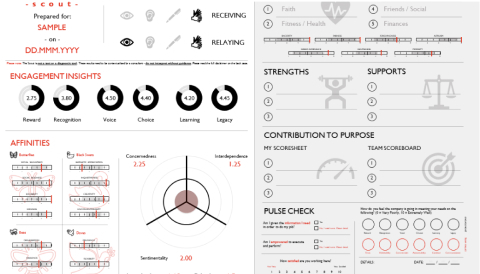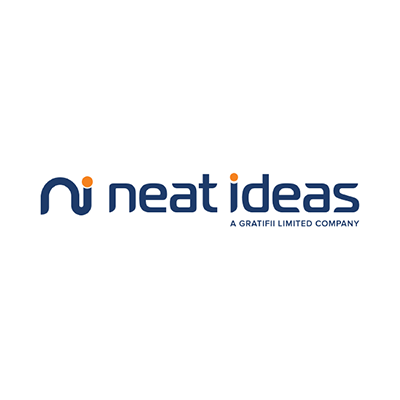
The Scout
A one-page dashboard…and how you can use it to better understand your team members and fully engage them.
The key to full engagement…and performance!
In sporting parlance, the background brief on a player is called a Scout – and that is what we have called our survey.
It has been more than a decade in the making and the result of our learnings from our work in professional sport and various non-sporting organisations including public, private and not-for-profit.
It considers a person from five key dimensions. Each providing a contextual framework for the other.
This is not a psychometric test (like many on the market) but a full engagement methodology that seeks to understand the human being, maximise their strengths, make their weaknesses irrelevant, and fully engage them.
Starting with Character and Values or what we call the pursuit of goodness – considering not just “what” is accomplished but also “how” and it ends with maximising a person’s unique strengths and abilities.
The Scout
Dimension 1
Humanising the Person
Dimension 2
Character & Values
Dimension 3
Communication & Emotionalities
Dimension 4
Strengths & Weaknesses
Dimension 5
Full Engagement
Dimension 1
Humanising The Person
Authentic Engagement
The first and most important of the five, is the human being.
It is critical to authentically engage with each other.
As Peter Drucker wisely noted, “good manners…asking after her family enable two people to work together. Manners are the lubricating oil of an organisation.”
You don’t hire a hand – the whole person comes to work…
Investing in getting to know what’s important to those on the team. A good starting point is to explore what we call the Five F’s…
The 5 F’s
• Faith/Values
• Fitness/Health
• Family
• Friends/Social
• Finances
Dimension 2
Character & Values
Whilst most aspire goodness, we are increasingly witnessing evidence to the contrary in organisations and workplaces.
Bad behaviour, resulting in scandals, illegal activity, corruption, toxic workplaces and unhappy employees.
But what defines goodness?
What does good character and values really mean? Why are some people exploitative, manipulative and self-entitled? And others not?
Recent studies on goodness or true north principles have provided management with useful tools in this regard.
Our Scout explores this character dimension and provides a better understanding of a person’s propensity to do good…or the alternative.
Humility, Honesty & Hardwork
Fairness, Empathy, Kindness, Patience and Generosity.
Dimension 3
Communication & Emotionalities
Communication
Receiving and Relaying…
Knowing how someone takes in information and how they express themselves is critical. It makes for efficient and effective communication in the team/organisation.
This usually fall into four key groups:
> Visual > Auditory > Written > Kinaesthetic
Emotionalities
🚑 Resilience – Resilience – someone who is able to draw upon this strengths to cope and recover from challenges.
😰 Concern – tendency to be preoccupied by minor problems or feel little stress in response to difficulties.
🧸 Sentimentality – tendency to strong attachments and empathic sensitivity to other’s feelings or to feel little emotion to the concerns of others.
🧑🏾🤝🧑🏻 Interdependence – self-assured and able to deal with problems without any help,, or needing to share difficulties with others and requiring encouragement, comfort and support.
Dimension 4
Strengths & Supports (weaknesses) Affinities
Affinities
🦋 Socially Confident & People Oriented: Understanding a person’s social self-esteem, boldness, sociability, liveliness and enthusiasm. High scorers suit roles that require human interaction.
🕊️ Calm, Flexible & Patient: How does one deal with others – mild and lenient or critical and hash; willingness to compromise and co-operate or unreasonable; patient, calm and accommodating or quick to react with negative emotions.
🐝 Organised & Detail-Oriented: Provides us insights on work ethic, self-discipline, being organised and structured, attention to detail, being deliberate and considered.
🦢 Innovative & Intellectually Curious: Openness to new ideas, experimentation, creativity, aesthetic appreciation and unconventionality.
Strengths
We firmly believe that every human being is unique with distinctive strengths (and weaknesses), has something important to contribute, has a special purpose, must be encouraged and given the opportunity to achieve their full potential.
Only when we authentically identify those strengths and maximise them do we have full engagement and performance.
Support
The corollary to this is our weaknesses. Knowing our weakness is just as important – for we all have them.
It is a manager’s job to maximise strengths and make weaknesses irrelevant. The latter is accomplished by putting the right support mechanisms in place.
Especially in team environments, this requires vulnerability and trust. Vulnerability to admit one’s weaknesses and trust that the team will support them.
Dimension 5
Engagement Factors
Reward & Recognition
How is performance managed? Is it recognised or rewarded, or both. What matters more? And how do we facilitate this based on an individual’s personal circumstances?
Voice & Choice
Does the individual need to have a say in what is being achieved? If so how much? Or does s/he prefer to go with the flow?
Learning & Legacy
Deep within each of us is a yearning to constantly learn. There is also a desire to leave a legacy – to have achieved something..to make a difference. Understanding to what extent is critical in full engagement.

Disclaimer
The Scout is not a test, and it is not a diagnostic tool. It is a visual representation of an individual’s preferences, based on their responses to the questions in the survey.
Scout results need to be contextualised by a consultant – do not interpret without guidance. To arrange a consultation please contact survey@marvinscout.com.
What our clients say about us
During a recent DLGSCI Leadership series workshop, describing core values of successful teams and how to implement them, Nick presented “The Scout” framework comprised of Five Dimensions. All 20 WA State level coaches and officials in attendance, and myself, were very impressed and would unreservedly recommend “The Scout Survey” to any organisation engaged in recruitment, leadership development and cultural change.
How we do something (character) is more important than what we do, measuring our behaviours not just outcomes, and conducting weekly catch ups with staff (not annual reviews) are just 3 take-aways from what was a truly inspiring delivery.
Dr Sandy Gordon, Director,
Performance Perspectives International

Their unique methodology not only identified the appropriate skills but more importantly the right character and culture fit for our business.
Rockingham Baldivis

By using marvin they took care of all the work involved with identifying and screening the right person for the job and the right fit for our organisation.The Scout Survey gave us insights and practical tools to engage our staff better and improve team performance…We highly recommend them.

We engaged marvin or a recruitment process focused on locating a person whose character was the best work cultural fit. We have an established set of values, so we were keen to find someone open to our way of working. From day one, our new recruit was a great fit.

A one-page dashboard…and how you can use it to better understand your team members and fully engage them.